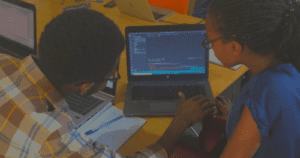Are you a newbie in the programming world, feeling overwhelmed and intimidated by lines of code and complex jargon? Don’t worry, you’re not alone! Many aspiring programmers start their journey feeling lost and unsure of where to begin.
It’s easy to feel like an outsider looking in. The language, the syntax, the tools, the frameworks – it can all seem like an impenetrable fortress, reserved only for the initiated. But the truth is, programming is for everyone, and with the right approach and mindset, you can break down those barriers and unlock a whole new world of possibilities here are some tips.
1: Embrace Your Newbie Status
Acknowledge your starting point: It’s okay to be a beginner! Everyone starts somewhere, and programming is a complex skill that takes time and effort to master. Embrace your newbie status and be proud of yourself for taking the first step toward learning to code.
- Avoid comparison: Don’t compare yourself to more experienced programmers or feel discouraged by their accomplishments. Remember that everyone progresses at their own pace, and comparing yourself to others can be counterproductive. Focus on your own progress and celebrate your achievements, no matter how small they may seem.
- Ask for help: Don’t be afraid to ask for help when you need it. Programming is a collaborative field, and seeking assistance from others is a sign of strength, not weakness. Join online communities, forums, or coding groups where you can ask questions, share your challenges, and learn from others’ experiences.
2: Set Realistic Goals
Define your purpose: Why do you want to learn to program? What are your long-term goals? Understanding your purpose will help you stay motivated and focused on your learning journey. Write down your goals and refer to them regularly as a source of inspiration.
- Start small: Programming can be overwhelming, with its vast array of languages, frameworks, and concepts. Start with one language or framework and gradually build your knowledge and skills from there. Avoid trying to learn everything at once, as it can lead to burnout and frustration.
- Break tasks into smaller steps: Instead of tackling a large programming project all at once, break it down into smaller, manageable tasks. This will help you stay organized, motivated, and less overwhelmed. Celebrate your progress after completing each task, and use it as momentum to keep moving forward.
3: Build a Strong Learning Foundation
Understand fundamental concepts: Before diving into complex programming concepts, make sure you have a solid understanding of the basics.
Learn concepts such as data types, variables, loops, conditionals, and functions, which are fundamental to most programming languages. Don’t rush through these concepts, as they form the foundation of your programming knowledge.
- Practice coding regularly: Programming is a skill that requires practice. Set aside regular time for coding exercises, projects, or challenges to reinforce your learning. Build a coding habit and make it a part of your daily routine. Don’t be afraid to make mistakes or encounter challenges; it’s all part of the learning process.
- Utilize learning resources: There are abundant learning resources available for code newbies, including online tutorials, coding bootcamps, coding challenges, and textbooks. Experiment with different resources and find the ones that work best for your learning style. Don’t be afraid to try multiple approaches and learn from different sources.
4: Cultivate a Growth Mindset
Embrace failure as a learning opportunity: Failure is a natural learning process. Don’t be discouraged by mistakes or setbacks; instead, view them as opportunities to learn and grow. Analyze what went wrong, figure out how to fix it, and apply the lessons learned to future projects.
- Stay curious and open-minded: Programming is a constantly evolving field, and there is always something new to learn. Stay curious and open-minded, and be willing to explore new concepts, languages, and technologies. Don’t be afraid to step out of your comfort zone and challenge yourself with new coding projects or tasks.
- Persist through challenges: Programming can be challenging, and you may encounter roadblocks or obstacles along the way. Don’t give up! Keep a positive attitude, be patient with yourself, and persist through challenges. Break problems down into smaller, manageable pieces, and approach them systematically. Remember that overcoming challenges and solving problems is a valuable skill in programming and an opportunity for growth.
- Believe in your abilities: Confidence in your abilities is key to empowering yourself as a code newbie. Believe that you are capable of learning and mastering programming, regardless of your background or experience level. Don’t let imposter syndrome or self-doubt hold you back. Celebrate your achievements, no matter how small, and acknowledge your progress. Surround yourself with a supportive community that encourages and uplifts you in your coding journey.
5: Engage in the Programming Community
Connect with others: Building connections with fellow programmers can be a valuable source of support, motivation, and learning. Join online communities, forums, or coding groups where you can connect with like-minded individuals, share your progress, ask for advice, and learn from others’ experiences.
- Collaborate on coding projects or participate in hackathons to gain practical experience and learn from other programmers.
- Learn from mentors: Finding a mentor or a more experienced programmer who can guide you can greatly accelerate your learning journey. Look for mentors in your local community, online forums, or coding communities. Be proactive in seeking guidance, and don’t be afraid to ask questions or seek advice. Learning from someone with experience can provide you with valuable insights, tips, and shortcuts.
- Share your knowledge: As you progress in your coding journey, consider giving back to the community by sharing your knowledge. Share your experiences, insights, and tips with other code newbies who may be starting out. Teaching others can deepen your own understanding of programming concepts and contribute to a supportive and collaborative community.
Conclusion:
Empowering yourself as a code newbie requires embracing your newbie status, setting realistic goals, building a strong learning foundation, cultivating a growth mindset, and engaging with the programming community.
Remember that learning programming takes time and effort, and it’s okay to make mistakes and encounter challenges along the way. Believe in yourself and your abilities, and don’t be afraid to ask for help or seek guidance when needed.
Final thoughts:
With the right mindset, determination, and support, you can crack the code and become a successful programmer, regardless of your background or experience level. Keep learning, growing, and coding with confidence, and you’ll be well on your way to mastering the world of programming!



